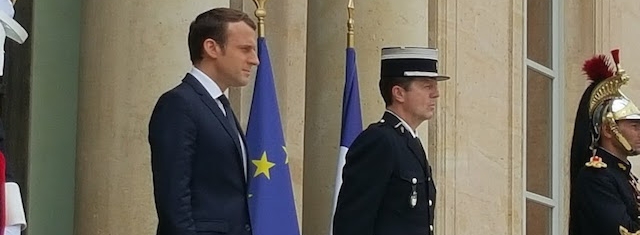Politics
THE SPEECH OF PRESIDENT MACRON FOR THE CENTENARY OF THE BATTLE OF THE LYS
7000 SOLDIERS WERE KILLED IN 1918

French President Emmnuel Macron Elysee (Source: Rahma Sophia Rachdi, J Foster)
USPA NEWS -
Hundred years ago, to the day April 9, 1918, the first shells of the battle of the Lys disemboweled the land of Flanders again. And again this earth, burdened with blood and tears, delivered to the repeated madness of times a terrible harvest. And it is not so much the blood of the enemies of then as that of the friends of always, who has watered the furrows of the Lily. Hundreds of Portuguese soldiers perished during this day, bravely fighting an unequal battle between 20,000 of their own men and more than 50,000 Germans who seized their last chance to win the war before the arrival of reinforcements from the United States to swell. the ranks of the Allies." Introduced President Macron, as a preamble of his speech for the anniversary of the century of the Battle of the Lys. We publish the entire transcript, of the speech, before the President of Portugal, Marcelo rebel de Souza, the Portugese Prime Minister, and José Alberto Azerdo Lopes, The Minister of Defense.
Mr President of the Portuguese Republic, Dear Marcelo, Dear Prime Minister, Dear Antonio, The Minister of Defense, José Alberto AZEREDO LOPES, Madam Minister, The Chief of Staff of the Portuguese Armed Forces, Admiral,
Chiefs of Staff, Mr. Prefect, Ladies and gentlemen, Mr. Chairman of the County Council, Mr. Mayor, Ladies and Gentlemen the Elected, Mr. President of the Veterans League, Mr. Chairman of the Portuguese Commission commemorating the Centenary, Dear friends, Hundred years ago, to the day April 9, 1918, the first shells of the battle of the Lys disemboweled the land of Flanders again. And again this earth, burdened with blood and tears, delivered to the repeated madness of times a terrible harvest. And it is not so much the blood of the enemies of then as that of the friends of always, who has watered the furrows of the Lily. Hundreds of Portuguese soldiers perished during this day, bravely fighting an unequal battle between 20,000 of their own men and more than 50,000 Germans who seized their last chance to win the war before the arrival of reinforcements from the United States to swell. the ranks of the Allies.
-----------------------------------------------------------------------------------------------------A total of 7,000 Portuguese soldiers were killed, wounded or taken prisoner on that single black day, the deadliest day of the Great War for your people. This makes this battle of the Lys the equivalent for the Portuguese of the Battle of Verdun for the French. Through the memory of this battle, it is the memory of all the Portuguese soldiers who fought with the allied forces in France, but also in Angola and Mozambique, whom we honor today. It is the memory of all these young men that you have just remembered and those names that are here today among you, because we will never forget what they are dead for.------------------------------------------
This cemetery where nearly 2,000 Portuguese soldiers died on the soil of France, as well as the monument of the Couture, show the recognition of the French people and all the Allies with respect to the Portuguese people who made a painful effort and paid a heavy price to fight with us. Like others, this necropolis makes space feel the abject disproportion of violence in which Europe has deteriorated during a war that appears to us today all the more absurd as we see it with our European eyes as a civil war, so painfully fratricidal. If we are here in Richebourg, it is also to reiterate the wish that never again a European should take up arms and kill his neighbor, that never again will the peoples and nations of Europe have to fight in internal wars. Today this cemetery is a symbol of friendship and European solidarity and not nationalist resentment. To avenge our dead by other deaths, to redeem them with new sacrifices only prolonged the horror and led us to the greatest catastrophe ever known to mankind. Fortunately, we knew after 1945 not to repeat the mistakes made after 1918. After going at the end of the night, at the end of the madness, at the end of the violence, we finally learned lessons from History and make proof of wisdom. We knew how to build reconciliation instead of feeding bitterness, resentment and the taste for revenge. We have been able to straighten and seize hands, to build relationships no longer of rivalry and competition, but of fraternity and cooperation. We knew how to unite. Since then, it is on the solid foundation of these values “‹“‹that we have founded Europe and it is these values “‹“‹that we still aspire today to defend and deepen. Hundred years later, the contrast between the Europe of 1918 traumatized by four years of a war hitherto uncommon, amputated from its youth, and that of 2018, democratic, in peace for more than 70 years, must exalt our convictions and our European ambitions. We do not have the right to get used to this Europe in which we live, as if it were of nature, as if it were not just the result of what we have been able to build over time, as if it were was not the result of this bloodshed. And those who think today that we could stammer our history by recreating, within our Europe, tensions, nationalism, drama, have a very sad memory of the blood that has flowed.
And at the moment when Europe doubts itself, when some of these peoples express their fear of the future by putting their fate in the hands of leaders who feed on anxiety, these are the achievements that We must remember, that we must salute, that we must continue. It is the peace that we have built and consolidated, the fruitful links we have established, the principles of mutual aid and solidarity that we have instituted and which are mutually beneficial to us, that we must defend and always promote. Europe is perfectible, we know it. Europe needs to be reformed, we are working on it and we are working in close cooperation with Portugal on a number of projects of the highest importance. We are working on it with all our allies in the brother countries, here represented by their ambassadors.----------------------------------------------------------------------------------
And we have this friendship between our two countries, between Portugal and France, this deep, solid friendship, cemented by the thousands of Portuguese and French of Portuguese origin, whose energy and work every day strengthen our nation, cemented by the blood shed by these young men who came to defend our freedom, already our Europe, by these decades made in common, and all those women and men who decided to build their future and their family between our two countries, as much discarded bridges. France and Europe of 2018 can look at each other with dignity in the mirror of 1918. Our European pride must be rooted in this path traveled, staking multiple progress of peace, prosperity, freedom. We must continue to make Europe the dream of a continent that has lived through a nightmare and only thinks of it by shaking; our common past confirms that the direction we must continue to take is that of a shared future. We owe it to our history, we owe it to our dead, but above all we must not, dear Marcelo, dear Antonio, as brothers of Europe, to our youth. So long live Portugal, long live France and long live the friendship between Portugal and France. Source Elysee
French President Macron Battle Of Lys Portugal Flanders Marcelo Rebelo De Souza President Of Portugal Antonio Costa Jedi Foster Rahma Sophia Rachdi
Liability for this article lies with the author, who also holds the copyright. Editorial content from USPA may be quoted on other websites as long as the quote comprises no more than 5% of the entire text, is marked as such and the source is named (via hyperlink).







